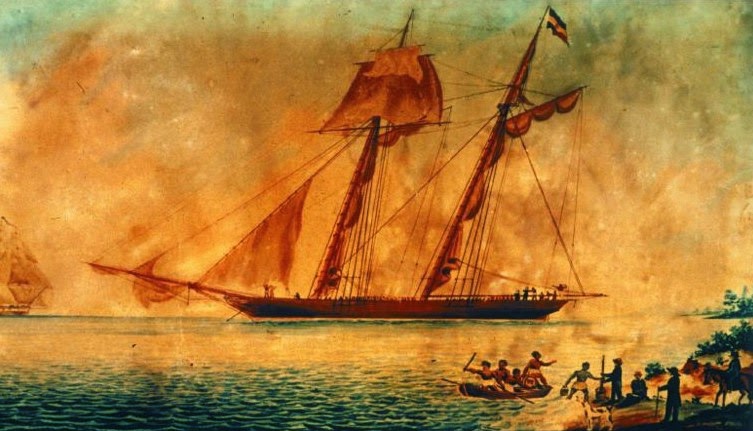 |
| Mizra Buzurg |
Known as Mirza Buzurg, Baha’u’llah’s father was a former vizier to the Shah’s twelfth son, then later appointed governor of the province of Luristan in Persia (now Iran). Mirza Buzurg owned a number of slaves. Slaves were common throughout Persia in the 19th century, as elsewhere in the world, including America.
Mirza Buzurg died in 1839. Baha’u’llah never purchased nor owned slaves, but probably inherited his father’s slaves, considered property that would be passed from father to son. Mirza Buzurg Baha’u’llah strongly disapproved of slavery. So what did Baha’u’llah do with these slaves, upon Mirza Buzurg’s death? Baha’u’llah set them free! In the 1830’s, an action like this was unheard of, especially in Persia.
How do we know this? Dr. Saiedi has discovered a key piece of evidence — Baha’u’llah’s written, autobiographical account, which has not only historical value but remarkable spiritual value, as well. Most of the Arabic text has been carefully transcribed by Dr. Saiedi, who now offers his provisional translation into English, published here for the very first time.
What is even more interesting is that this remarkable Tablet is cast in the form of a prayer, to God:
Sanctified art Thou, O my God! At this moment, one slave (mamlūk) is standing before another slave and seeks, from him, his freedom.
Yet his owner, himself, is naught but a slave of Thee, a servant in Thy Threshold, and absolute nothingness before the manifestations of Thy Lordship.
Standing before Thee, I bear witness, at this very moment, to that which Thou hast testified by Thyself for Thyself, that verily Thou art God and there is none other God but Thee …
All mighty kings are mere slaves before the gate of Thy grace, and all the wealthy are the essence of poverty in the shore of Thy holy dominion, and all the exalted are abject lowliness within the glorified court of Thy bounty.
Notwithstanding this, how then can this slave claim for himself ownership of any other human being? Nay, his existence is a mere crime, graver than any sin in Thy kingdom …
And now, O my God, since that servant hath asked from this servant his freedom, therefore, I call Thee to witness, at this moment, that I am setting him free in Thy path, liberating him in Thy name, and emancipating his neck from the chain of servitude, so that he may serve Thee in the daytime and in the night season, longing that my neck would never be relieved from the cord of Thy servitude.
This verily is my most cherished desire and my supreme end. – Baha’u’llah, unpublished Tablet (A08212). Provisional translation by Nader Saiedi, Ph.D.
Who is this slave Baha’u’llah sets free? Dr. Saiedi believes that it is none other than Isfandiyar, whose story I told in “The Races – Robed in Black or White: The Universal Emancipation Proclamation, Part 4.”
Again, the year is 1839. Mirza Buzurg had just died. Isfandiyar stands before Baha’u’llah. Isfandiyar asks Baha’u’llah to set him free.
Baha’u’llah grants Isfandiyar’s wish, but does so in a most extraordinary way, in dignified humility, clearly showing that both Isfandiyar and Baha’u’llah himself, as human beings, are equals in the sight of God.
Thus this unpublished Tablet predates what we have previously referred to as Baha’u’llah’s “Universal Emancipation Proclamation” of 1873, by some 33 or 34 years. In fact, Baha’u’llah uses the very same reasoning that he would use when promulgating the first formal prohibition of slavery in the history of religion, in this divine decree:
It is forbidden you to trade in slaves, be they men or women. It is not for him who is himself a servant to buy another of God’s servants, and this hath been prohibited in His Holy Tablet. Thus, by His mercy, hath the commandment been recorded by the Pen of justice. Let no man exalt himself above another; all are but bondslaves before the Lord, and all exemplify the truth that there is none other God but Him. He, verily, is the All-Wise, Whose wisdom encompasseth all things. – Baha’u’llah, Kitab-i-Aqdas, Par. 72. 1840 engraving depicting the Amistad revolt.
According to Abdu’l-Baha, Isfandiyar, now gratefully freed from the bonds of slavery, chose to remain as Baha’u’llah’s faithful servant, until 1852, when Baha’u’llah was imprisoned in Tehran’s “Black Pit,” and Isfandiyar’s life was placed in mortal danger. (See “The Universal Emancipation Proclamation: Part 1.”)
Thanks to the resourcefulness of Baha’u’llah’s wife, Navvab, the Governor of Mazandaran, Mirza Yahya Khan, gave Isfandiyar shelter and protection. The Governor then engaged Isfandiyar as his head servant, placing him in charge of all the affairs of his household — a privileged and prestigious position that Isfandiyar held for the rest of his life.
 |
| The Schooner Amistad |
In 1839, the transatlantic slave trade was illegal. But ownership of slaves was perfectly acceptable. So Baha’u’llah’s 1839 liberation of Isfandiyar was well in advance of developments in the rest of the world.
Read the previous article in the series: The “Lincoln of the Spirit” and the “Black Plato”
©2014 by Christopher Buck. The opinions and views expressed in this article are those of the author only and do not necessarily reflect the opinion of BahaiTeachings.org or any institution of the Baha’i Faith.
